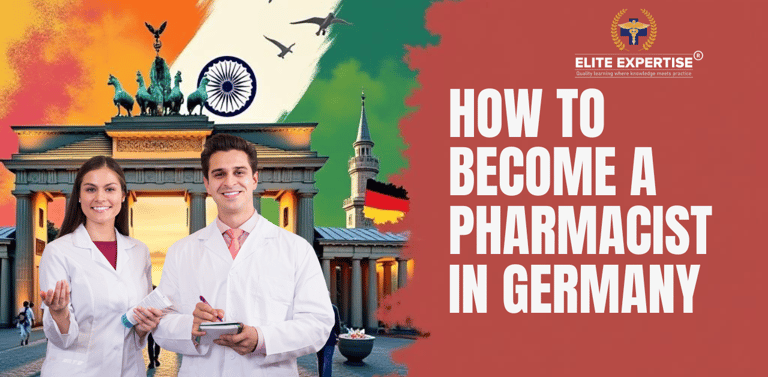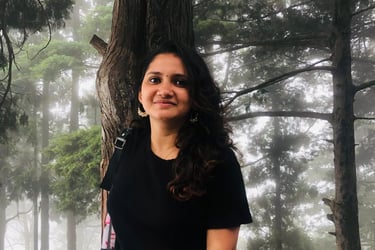ASK MY PHARMACIST | GOT QUESTIONS? Your pharmacist has answers. Click Here
How To Become A Pharmacist In Germany In 2025 For Indian Pharmacists
Learn the essential steps to become a pharmacist in Germany, from education requirements to licensing. Start your journey to a rewarding career today!
Krupa
8/16/20254 min read


For Indian pharmacy graduates, the journey to becoming a licensed pharmacist in Germany involves various steps. Candidates have to go through a recognition process of qualification, meet German language requirements, and, in some cases, complete extra training or pass an exam
Germany is one of the most attractive countries for pharmacists who aspire to work abroad. Germany is known for its world-class healthcare system, excellent job security, and high standard of living. It also offers a low or no tuition fee at public universities.
This blog post deals with each stage of the process for overseas pharmacists who wish to migrate to Germany.
Key points to note
Understand the procedure for recognising an Indian pharmacy qualification in Germany
Understand the details regarding the German Language levels requirements
Known about exams, internships, and training that may be required
Details of documents required and certifications
Becoming a Pharmacist in Germany
Germany requires a 5-year pharmacy degree for licensing.
You must submit your documents to the State Health Authority for degree recognition in Germany.
A fee between €200 and €600 is required for degree recognition in Germany, varying by state.
A six to twelve-month internship in a German pharmacy is required before obtaining a license.
The fee for applying for Approbation in Germany is approximately €150 to €300.
Step-by-step process for becoming a pharmacist in Germany
Step 1: Check if your degree is equivalent to German standards
Step 2: Apply for degree recognition (Berufsanerkennung)
Step 3: Meet the German language requirements
Step 4: attempt exam or internship
Step 5: Complete your practical training
Step 6: Get your license to practice (Approbation)
Step 7: Start your career in Germany
Let's understand the details of each step:
Step 1: Check the degree equivalence
A typical pharmacy degree span of Germany is around 5 years. The first step is confirming whether your Indian qualification is comparable.
Indian pharmacy degrees that are accepted in Germany is:
PharmD: 6 years of education
B. Pharm + M. Pharm: usually accepted as equivalent
B. Pharm only: may require you to pass an additional knowledge assessment before approval.
Step 2: Apply for recognition (Berufsanerkennung)
Your application goes to the State Health Authority (Landesprüfungsamt) in the region where you want to work.
Typical documents include:
Academic certificates & transcripts
Detailed course syllabus
Passport copy
Curriculum Vitae (CV)
Internship or work experience proof
The authority will compare your qualifications with German requirements and inform you if you can proceed or need extra steps.
Step 3: Meet the German Language Requirements to work as a pharmacist
For overseas pharmacists from India, proficiency in the German language is essential. Strong skills in the German language are essential for pharmacists. Candidates have to prove:
B2 General German (for everyday communication)
C1 Fachspracheprüfung — a specialised test for pharmacy-related and medical vocabulary
Candidates must start the language preparation studies early. Achieving C1 can take 1-2 years and mastering the language will make the entire process easier.
Step 4: cover the additional requirement with a further Exam or internship for pharmacy students
If the Indian degree is not fully equivalent, candidates must choose between:
Kenntnisprüfung — A German-language exam covering pharmacy subjects.
Anpassungspraktikum — A 6-month internship under supervision in a German pharmacy.
The exam route is quicker but more academically intense, while the internship offers valuable hands-on experience.
Step 5: Complete the practical training for a foreign pharmacist
If you haven’t yet met Germany’s practical training criteria, you may need to complete a 6–12-month Praktisches Jahr (practical year) in a pharmacy.
This period allows you to:
Understand local pharmacy operations
Improve your communication with patients
Adapt to Germany’s healthcare rules and workflows
Step 6: Get the Approbation (License to Practice) for the registration process
The Approbation is the official authorization to work as a pharmacist in Germany. To get it, you must:
Complete degree recognition
Pass the necessary language exams
Finish any extra training or tests
Once granted, your Approbation allows you to practise anywhere in the country.
Step 7: Start the pharmacy career in Germany for licensed pharmacist
Licensed pharmacists from overseas who have completed all the requirements can start their career in Germany in different sectors, such as:
Community pharmacy
Retail Pharmacy
Hospitals
Pharmaceutical manufacturing and research
Academia and training
Rural areas in Germany have a greater demand for pharmacists and may offer better salary packages. There is a need for pharmacists in Germany because of the aging population.
Pharmacy Education in Germany
The bachelor's degree in Pharmacy in Germany typically takes three to four years to complete.
A master's degree in Pharmacy is often combined with the bachelor's program into a single curriculum.
German language proficiency are essential for student visa support and german degree
Many universities in Germany provide intensive German language courses for students to improve their proficiency.
Germany has numerous top universities where students can study pharmacy and gain practical skills.
Many universities in Germany offer intensive German language courses to help improve the language skills of prospective pharmacy students.
Fluency in German is essential for pharmacists to communicate effectively with patients and healthcare professionals in Germany.
Job Opportunities for Pharmacists in Germany
The demand for pharmacists is consistently high in various sectors in Germany, including community pharmacies, hospitals, and the pharmaceutical industry.
Many universities in Germany offer English-taught master's programs in pharmacy for international students.
International Pharmacists in Germany
Germany requires international pharmacy graduates to check their degree equivalency before proceeding with registration.
International pharmacy graduates must submit their documents to the State Health Authority for recognition of their foreign degrees in Germany.
If a foreign degree is not deemed equivalent, international pharmacy graduates may be required to take a knowledge test in Germany.
International pharmacy graduates must complete a 6–12 month internship in a German pharmacy unless exempted.
Pharmacist profession can work in regulatory affairs for drug development, health insurance department
The final step for international pharmacy graduates to work in Germany is to apply for the Approbation, which is the official license to practice even in pharmaceutical companies
International pharmacy graduates must prove their German language skills as a requirement to work in Germany.
What are the tips for Indian graduates to consider while migrating to Germany?
Consider enrolling in a Master’s degree in Germany in public universities that are often free or very affordable.
Use your study time to enhance German skills and prepare for licensing requirements.
Pursuing a Ph.D. after your Master’s can lead to careers in research or teaching.
Passing the C1 Fachspracheprüfung is not just about memorising words; you must be able to communicate naturally and effectively with patients, colleagues, and interviewers.
If German proficiency feels like a challenge, English-speaking countries such as Australia, Canada, or Ireland might be better alternatives.
Conclusion:
Becoming a licensed pharmacist in Germany is very achievable for Indian graduates, but it demands dedication, careful preparation, and strong German skills. With the right strategy, you can secure a rewarding career in one of Europe’s most respected healthcare systems.


About the Author
Krupa Karamchand
Content Writer | Elite Expertise
Krupa Karamchand is a B. Pharm graduate and KAPS-qualified pharmacist with over 7 years of experience in the pharmaceutical field. As an experienced SEO content writer, she combines her in-depth healthcare knowledge with proven digital strategies to create informative, engaging, and search engine–optimized blogs. Krupa is passionate about making complex medical topics easy to understand and accessible to all readers.
Follow On
Follow Us
+91 76750 84909
Privacy Policy | © 2025 Elite Expertise . All Rights Reserved.
ELITE EXPERTISE PTY. LTD (ABN: 15668292439) (ACN: 668292439)
Australian Statutory Education License: OPP 2025 ELITE EXPERTISE PTY. LTD
Disclaimer
Elite Expertise is an online education platform dedicated solely to providing coaching and preparation services for the OPRA, PEBC, PSI and PTE exams. We do not offer any sponsorship or migration services. All information provided on our platform is for educational purposes only and should not be interpreted as legal or immigration advice. For inquiries regarding sponsorship, visa applications, or migration services, please consult with licensed immigration professionals or relevant authorities.
Elite Expertise is a trusted and results-driven training platform specializing in preparation for international pharmacist licensing exams. Our comprehensive courses, expert instructors, and proven methodologies have helped countless pharmacy professionals achieve their goals and succeed in competitive regulatory exams. We are proud of our strong success rate and commitment to excellence.
Elite Expertise is an independent training provider. We are not affiliated with any global pharmacy regulatory authorities or official exam-conducting bodies.
Copyright © 2026 Elite Expertise. All rights reserved.
Address
Unit 1/73 Beverley St, Doncaster East VIC 3109, Australia
